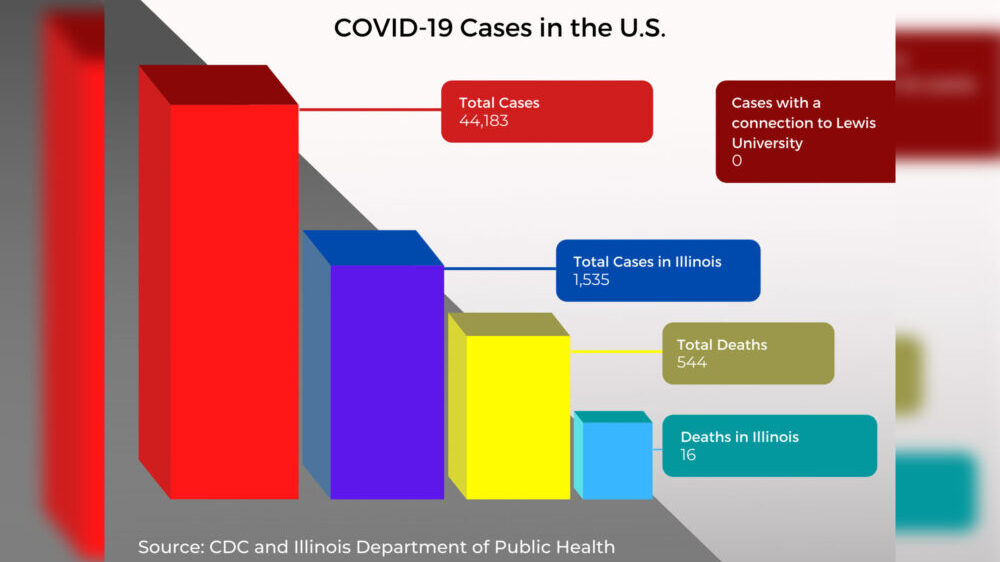
On March 19, Lewis’s actions to take COVID-19 precautions changed everyday operations for the remainder of the semester. Students were notified that all face-to-face spring and summer 2020 classes are to be delivered through online learning methods starting March 23. In addition to changing to an online class format, all Residence Halls were to be closed at 5 p.m. on March 21 and the May Commencement ceremony would have to be rescheduled.
While no members of the campus community have reported having the coronavirus at this time, the Center for Disease Control and Prevention (CDC) reports that there are more than 82,000 cases in the U.S. at the time of this writing. In Illinois alone, out of a total of 11,485 people tested, 1,535 have been confirmed to have the virus, while 16 have died, according to the Illinois Department of Public Health.
In efforts to reduce the spread of the virus, Governor J.B. Pritzker announced a state-wide stay at home order, which took effect on March 21 at 5 p.m. and will last at least until April 7. Illinois was joined by California, New York, Connecticut, New Jersey and Oregon with their own version of stay at home or stay in place orders. Residents can still run errands to grocery stores, pharmacies and clinics, but all other business has been deemed non-essential.
Abiding by this stay at home order, the estimated 100 students who petitioned to remain on campus are currently living in their original dorms. Most of the students who are on campus are international students. Some other students who may not have access to technology outside of campus as well as students who are working as graduate assistants performing research in the science labs are staying on campus as well.
The President’s Leadership Team and the Campus Emergency Preparedness Team, which includes members of the Lewis University Police Department and faculty members in human resources, had been monitoring the spread of the coronavirus since January. After making the decision to bring students studying abroad in Rome home on March 1, the teams began planning how campus operations would run moving forward the week of March 9.
“Usually those types of emergencies happen very quickly; they’re weather-related or event-related. This one, even though it felt very, very fast. We had a little bit of warning for, because it [was] a slowly growing outbreak, or at least, initially it was,” said Provost Dr. Christopher Sindt. “And then it felt when things moved to our area, the Chicagoland area…it did rapidly escalate in terms of the way universities were responding to the outbreak….”
In addition to all formerly face-to-face classes now being taught in an online format, all of these courses are also eligible for a pass/fail status. “The pass/fail option was something that we felt like we needed to make available to students recognizing the transition from face to face classes to online classes,” said Sindt.
“All of the accrediting agencies and even The Department of Education…have completely relaxed a lot of the requirements,” said Sindt. “In many cases, it’s temporary, so we are still really working hard on trying to figure out the best way to transition back into clinical sites as soon as we can.”
Faculty have also had to adjust their course material for the transition to an online format. While campus operations are currently shut down, it is uncertain whether some staff and campus operations will return to an in-person format before the end of the semester.
Photo credit: CDC – IDPH
